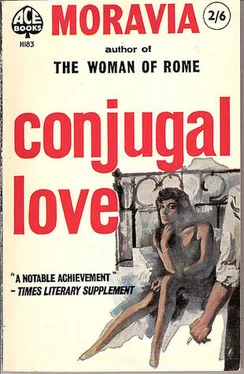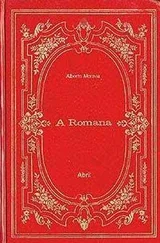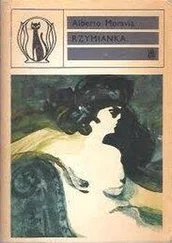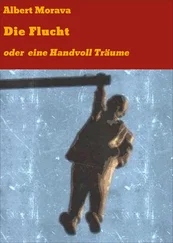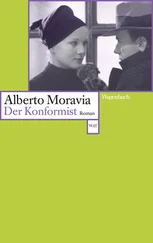'Quite soon. .at any rate for lunch.'
She was silent, and then went on, in a casual way: 'What's to be done if the barber comes?'
I thought for a moment, and then answered: 'I shall certainly be back before he comes… If by any chance I'm late, ask him to wait.' This reply was dictated by my dislike of having to make use of one of the barbers in the town, and of their razors which were used on other customers. Antonio brought with him nothing at all; all the required implements were supplied by me.
She said nothing, and we changed the conversation. Now that my work was finished I felt my love for my wife coming back as strong as before, and even stronger.
Or rather, I had loved her all the time, but, during those twenty days of work, I had, so to speak, suspended the expression of my love. We were sitting at table, in the little dining-room. Leda, as usual, was in evening dress, in a graceful white gown with long, flowing lines, low at the back and, with its simple draperies, rather like a Greek peplum. Round her neck, upon her fingers, and in the lobes of her ears were her jewels, all of them massive and of great value. The parchment-shaded lamp in the middle of the table lit up her face with a soft, golden light. Her face was expertly made up; and she had retained the short, curly coiffure that Antonio had devised for her. I noticed for the first time that her long, thin face, now that it had ceased to be enclosed between loose, trailing locks of hair, had assumed a quite different aspect from the one I was accustomed to: it appeared younger, less wistful, and had about it a look of cruel, archaic sensuality. No longer softened and caressed by the waving hair, the strained, unmoving slant of her enormous blue eyes, the sharp sensitiveness of her nostrils, the smiling bigness of her mouth — all were fully revealed. She seemed to have been stripped of something and therefore to be more real, with an antique, satyr-like appearance which reminded one at the same time of primitive Greek sculptures with set expressions of ironical ambiguity upon their brows, and of a goat's Semitic profile. To emphasize this appearance, my wife, as on the day of the Antonio incident, had fastened above her left temple, on the gold of her hair, a bunch of fresh, red flowers. Looking at her, I said: 'You know, after all, your hair as Antonio arranged it really suits you very well. . I've only just noticed it.'
She seemed to give an almost imperceptible start at the name of the barber and lowered her eyes. With her long fingers she was twisting the massive crystal stopper of a decanter, and between her pointed nails, red as rubies, the faceted stopper looked, in the lamplight, like an enormous diamond shot through with gleaming lights. She said slowly: 'The idea of doing my hair like this wasn't Antonio's, it was mine.. . All he did was to do what I told him — and badly, too.'
'And how did you come to think of it?'
'I used to wear it like this when I was a girl, very many years ago,' she said. 'It's an arrangement that suits either very young women, or' — and she smiled slightly — 'middle-aged ones, like me.'
'What d'you mean, middle-aged? Don't say such silly things.. . And those flowers suit you perfectly.. .'
The maid came in and we helped ourselves in silence. Then, when she had left the room again, I put down my knife and fork and said: 'You look like a different person… or rather, you're yourself all the time, but with a new appearance.' All at once I felt deeply disturbed, and I added in a whisper: 'You're very beautiful, Leda… it may be that I forget that, every now and then. . but the moment always comes when I realize how utterly in love with you I am.'
She went on eating and did not reply; but there was no sign of disdain, in fact a certain satisfaction was visible in the faint quiver of her nostrils and the droop of her lowered eyelids. It was her way of accepting compliments that were agreeable to her and I knew it. All at once there came over me an indescribable turmoil of love. I placed my hand on hers and murmured: 'Give me a kiss.'
She raised her eyes, looked at me, and asked, with simplicity and perhaps without any intended irony: 'Is your work finished, then?'
'No,' I lied, 'but I can't look at you without loving you and without wanting to kiss you. . To hell with my work.'
As I said this I pulled her by the arm so that she leant over in my direction. She resisted, frowning, with an air half serious, half tempted, and said briefly, in a voice full of love: 'You're crazy'; then turning suddenly, gave me the kiss I had asked for, abruptly, impetuously, but with sincerity. We kissed in breathless haste, crushing our lips violently against each other's; it was like the kiss of two ingenuous but ardent youngsters who are not yet expert in love and who spoil their own enjoyment by nervousness and impatience. And I, in that fleeting kiss — which I seemed to be snatching rather than merely receiving from my wife's lips — felt that I had in truth gone back to my boyhood and that I was in danger of being surprised by a stern mother, instead of a devoted old servant who would be both embarrassed and sympathetic. Immediately after the kiss we became composed again, just like two children; she serene and quiet, I a little out of breath. But the maid did not come; and I looked at my wife and then I managed to laugh, both at myself and at her, and I laughed and slapped her hand. This made her suspicious and she asked: 'Why are you laughing?'
'I'm sorry,' I said. 'I'm not laughing at you. . I'm laughing because I'm happy.'
With her eyes lowered, and in a calm, conversational tone, as she went on eating, she asked: 'And what is it that makes you so happy?'
This time I could resist no longer and I said, ingenuously: 'For the first time in my life I have everything I wanted, and what's more — a thing which is much rarer — I know that I have it. . '
'What was it you wanted?'
'For years and years,' I said, 'I've wanted to love a woman and to be loved by her in return. . Well, now I love you, and you, I believe, love me. For years and years I've had an ambition to write something lasting, something alive, something poetical. . Now that I've finished my story, I can say that I've achieved that too.'
I had decided not to speak to my wife about the story until I had finished copying it. But my joy was so great that I couldn't resist it. Her reaction to the news surprised me, although I knew that she loved me and took a lively interest in all that I did. 'You've finished?' she exclaimed, with a delight that was flattering because sincere, 'you've finished?' — and her voice had a clear ring in it which enchanted me — 'Oh, Silvio — and you never told me anything about it!'
'I didn't tell you about it,' I explained, 'because, although in the strict sense of the word I've finished, I've still got to type out the manuscript… I shan't really have finished till the day when I've finished the typing.'
'That doesn't matter,' she said, with that same complete and flattering spontaneity, 'you've finished and this is a great moment. . We must drink to the health of your book.'
Her manner was charmingly, impetuously affectionate and her blue eyes, so beautiful and so luminous, rested seductively upon me as though they wanted to caress me. With a hand that trembled slightly I poured some wine into our glasses. Then we raised them high above the table. 'To you and to your book,' she said in a low voice, looking at me. I drank, and saw her drink and then she put down her glass and leant towards me, offering her lips; and this time it was a true kiss, long and passionate, and it was only after we had finished kissing that we noticed that the maid had come in and was looking at us, leaning against the sideboard with the tray in her hands.
Читать дальше
